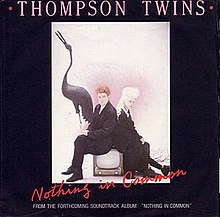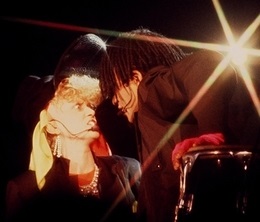
Thompson Twins were a British pop band that formed in April 1977. Initially a new wave group, they switched to a more mainstream pop sound and achieved considerable popularity during the mid-1980s, scoring a string of hits in the United Kingdom, the United States, and around the world. In 1993, they changed their name to Babble, to reflect their change in music from pop to dub-influenced chill-out. They continued as Babble until 1996, at which point the group permanently dissolved.

Set is the second studio album by English pop band Thompson Twins. Released in February 1982, it was the second album they recorded for their own T Records imprint, which was released by Arista Records/Hansa.

Into the Gap is the fourth studio album by British pop group Thompson Twins, released on 17 February 1984 by Arista Records. The album was recorded during 1983 at Compass Point Studios, in Nassau, Bahamas, and was produced by Alex Sadkin who had produced the band's previous album.

Here's to Future Days is the fifth studio album by the British pop group Thompson Twins. It was the third and final release for the band as a trio, which was their most successful and recognisable line-up. Released in September 1985, it peaked at no. 5 in the UK, and no. 20 in the US.

Close to the Bone is the sixth studio album by the British pop group Thompson Twins, released by Arista in March 1987. Now only the duo of Tom Bailey and Alannah Currie remaining, this was the first album the group made without Joe Leeway. It was produced by Bailey and Rupert Hine.

Big Trash is the seventh studio album by the British pop group the Thompson Twins, released in 1989 by Warner Brothers/Red Eye. It was produced by Tom Bailey and Alannah Currie, with two tracks produced by Steve Lillywhite.

Greatest Hits is a compilation album by British pop band Thompson Twins, released in 1996 on the Arista Records label.

Queer is the eighth studio album by the British pop group Thompson Twins, and the final one released under that name before the members changed it.

"Hold Me Now" is a song by British band the Thompson Twins. Written by the band members, the song was produced by Alex Sadkin and the group's lead vocalist Tom Bailey. The song is a mid-tempo new wave song that uses a varied instrumentation, including keyboards, a xylophone, a piano and Latin percussion. It was released in November 1983 as the first single from their fourth studio album, Into the Gap.
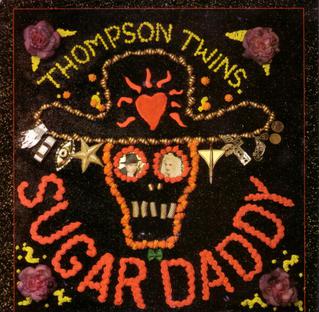
"Sugar Daddy" is a song by British pop group Thompson Twins, released in 1989 as the lead single from their seventh studio album Big Trash. It was written and produced by Alannah Currie and Tom Bailey. The single's B-Side, "Monkey Man", was exclusive to this single.

"Come Inside" is a song by British pop group Thompson Twins, released in 1991 as the lead single from their eighth studio album Queer. It was written and produced by Alannah Currie and Tom Bailey. The single peaked at No. 56 in the UK and spent four weeks on the chart. The single also peaked at No. 7 on the US Billboard Dance Music/Club Play Singles Chart. The single had a music video filmed to promote it.

"Get That Love" is a song by the British pop group Thompson Twins, released in 1987 as the lead single from their sixth studio album Close to the Bone. It was written by Alannah Currie and Tom Bailey, and produced by Rupert Hine and Bailey. The single peaked at No. 66 in the UK and spent four weeks in the Top 100. It fared better in America where it reached No. 31 on the US Billboard Hot 100.

"Doctor! Doctor!" is a song performed by the British pop group Thompson Twins. It is the second single from the band's fourth studio album, Into the Gap (1984). It was written by Tom Bailey, Alannah Currie and Joe Leeway, and prominently features a keyboard solo. Following the successful chart performances of the Into the Gap single "Hold Me Now", "Doctor! Doctor!" was released in the UK on 27 January 1984 as the album's second single.
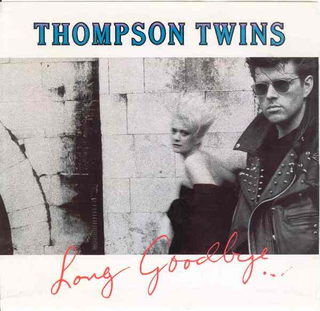
"Long Goodbye" is a song by the British pop group Thompson Twins, released in 1987 as the second and final single from their sixth studio album Close to the Bone. It was written by Alannah Currie and Tom Bailey, and produced by Rupert Hine and Bailey. "Long Goodbye" peaked at No. 89 in the UK.

"Lay Your Hands on Me" is the first single released from the album Here's to Future Days by the British band Thompson Twins. Written by Tom Bailey, Alannah Currie, and Joe Leeway, it was released in the UK almost a year in advance of the album.

"King For A Day" is a 1985 song by the British band the Thompson Twins. It was released as the third single from the band's fifth album Here's To Future Days.

"Don't Mess With Doctor Dream" is a 1985 song by the British band Thompson Twins. It was released as a single from their album Here's to Future Days, and peaked at No. 15 in the UK, spending six weeks on the chart. Written by bandmembers Tom Bailey, Alannah Currie and Joe Leeway, it is an anti-drug song warning of the dangers of drug addiction. It was the first Thompson Twins single to be co-produced by Nile Rodgers. A promotional music video was made for the single which was directed by Godley & Creme along with Meiert Avis.

Roll Over is a 1985 song by the Thompson Twins. It was intended for release as a single from the band's album Here's To Future Days, but was recalled and withdrawn from shelves the same day of release with the remaining copies destroyed. Some copies made it onto the market before being recalled. After a bout with nervous exhaustion which left him with no reflexes, lead vocalist Tom Bailey took it as a bad omen and decided against the release of the song. Subsequently, it was only released on the North American versions of the album. The versions found on the single are different mixes than the final album version which was co-produced by Nile Rodgers.

"The Gap" is a song by the British pop group Thompson Twins. It was the title track from the group's 1984 album Into the Gap, and was also released as a single in certain countries though not in the group's native UK. The single peaked at #69 in the U.S., spending six weeks on the US Billboard 100. It also charted in Germany where it peaked at #62. There was no promotional music video for this single.
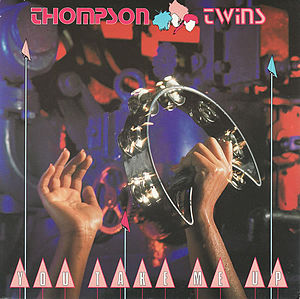
"You Take Me Up" is a song by the British pop group Thompson Twins. It was the third single to be taken from their 1984 album Into the Gap and was released in the UK on 23 March 1984. It was written by Tom Bailey, Alannah Currie and Joe Leeway, and prominently features harmonica and a melodica solo. The single peaked at #2 in the UK, making it their highest chart position for a song, and spent eleven weeks on the chart. In addition to the regular 7" and multiple 12" releases, Arista Records also released four different shaped picture discs for the single, three of which were part of a jigsaw.
